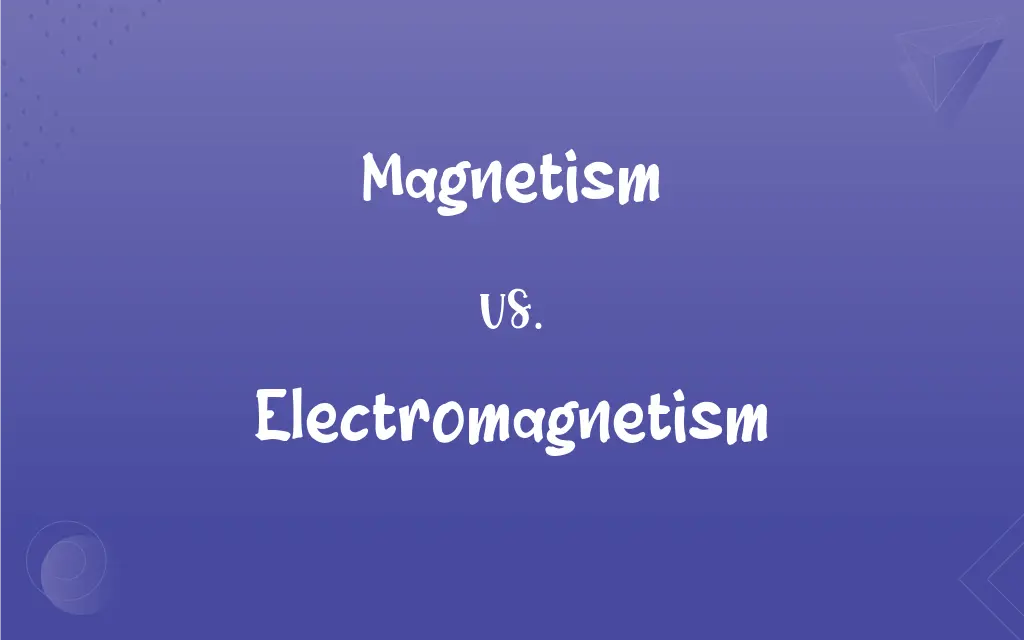Magnetism vs. Electromagnetism: What's the Difference?
Edited by Aimie Carlson || By Harlon Moss || Published on December 25, 2023
Magnetism is the force exerted by magnets, while electromagnetism encompasses the interaction between electric and magnetic fields.

Key Differences
Magnetism is a natural phenomenon associated with magnetic fields and forces produced by materials like iron. Electromagnetism, on the other hand, refers to the broader physical interaction that combines both electric and magnetic forces.
In magnetism, materials exhibit attraction or repulsion due to their magnetic properties. Electromagnetism extends beyond this, explaining how electric currents and magnetic fields influence each other.
Permanent magnets demonstrate magnetism by maintaining a persistent magnetic field. Electromagnetism includes phenomena like electromagnetic induction, where a changing magnetic field creates an electric current.
The study of magnetism focuses on objects' ability to attract ferromagnetic materials. Electromagnetism, as a fundamental force, integrates Maxwell's equations which describe how electric and magnetic fields are generated and altered by each other and by charges.
Magnetism is often observed in daily life through compasses or fridge magnets. Electromagnetism, however, is crucial in technologies like electric motors, which operate on principles of electromagnetic interactions.
ADVERTISEMENT
Comparison Chart
Definition
Force exerted by magnets
Interaction between electric and magnetic fields
Scope
Limited to magnetic fields and materials
Encompasses both electric and magnetic phenomena
Examples
Permanent magnets, compasses
Electric motors, electromagnetic induction
Fundamental Principles
Properties of ferromagnetic materials
Maxwell's equations
Technological Applications
Magnetic storage, magnetic locks
Generators, transformers, wireless communication
ADVERTISEMENT
Magnetism and Electromagnetism Definitions
Magnetism
A physical phenomenon produced by the motion of electric charge, resulting in attractive and repulsive forces.
The magnetism of a bar magnet aligns iron filings along its field lines.
Electromagnetism
A branch of physics that deals with the electromagnetic force.
Electromagnetism plays a key role in understanding how electric generators work.
Magnetism
The force exerted by magnets.
Magnetism causes a compass needle to point north.
Electromagnetism
The study of electromagnetic forces between electrically charged particles.
Electromagnetism explains the forces inside an atom.
Magnetism
The study of magnetic fields and their effects.
Magnetism explains why certain materials are attracted to each other.
Electromagnetism
The science of electric and magnetic phenomena.
Electromagnetism is essential in wireless communication technology.
Magnetism
The attraction or repulsion between objects due to their magnetic properties.
Magnetism enables fridge magnets to stick to a refrigerator door.
Electromagnetism
A fundamental force that combines electricity and magnetism.
Electromagnetism governs the behavior of electromagnetic waves like light.
Magnetism
The property of materials that respond to an applied magnetic field.
The magnetism of iron allows it to be attracted to a magnet.
Electromagnetism
The interaction of electric currents and magnetic fields.
Electromagnetism is the principle behind electric motors.
Magnetism
The class of phenomena exhibited by a magnetic field.
Electromagnetism
The physics of electricity and magnetism.
Magnetism
The study of magnets and their effects.
Electromagnetism
An interaction between electricity and magnetism, as when an electric current or a changing electric field generates a magnetic field, or when a changing magnetic field generates an electric field.
Magnetism
The force exerted by a magnetic field.
Electromagnetism
A unified fundamental force that combines the aspects of electricity and magnetism and is one of the four fundamental forces. (technically it can be unified with weak nuclear to form electroweak) Its gauge boson is the photon.
Magnetism
Unusual power to attract, fascinate, or influence
The magnetism of money.
Electromagnetism
Electricity and magnetism, collectively, as a field of study.
Magnetism
Animal magnetism.
Electromagnetism
Magnetism produced by an electric current;
Electromagnetism was discovered when it was observed that a copper wire carrying an electric current can magnetize pieces of iron or steel near it
Magnetism
(physics) The property of being magnetic.
Electromagnetism
The branch of physics concerned with electromagnetic phenomena
Magnetism
(physics) The science which treats of magnetic phenomena.
Magnetism
Power of attraction; power to excite the feelings and to gain the affections.
Magnetism
Animal magnetism.
Magnetism
The property, quality, or state, of being magnetic; the manifestation of the force in nature which is seen in a magnet. At one time it was believed to be separate from the electrical force, but it is now known to be intimately associated with electricity, as part of the phenomenon of electromagnetism.
Magnetism
The science which treats of magnetic phenomena.
Magnetism
Power of attraction; power to excite the feelings and to gain the affections.
Magnetism
Attraction for iron; associated with electric currents as well as magnets; characterized by fields of force
Magnetism
The branch of science that studies magnetism
FAQs
How do magnets demonstrate magnetism?
By attracting or repelling other magnetic materials.
What is magnetism?
The force exerted by magnets and magnetic materials.
What is electromagnetism?
The interaction between electric currents and magnetic fields.
Can magnetism be temporary?
Yes, in temporary magnets like electromagnets.
Is Earth's magnetic field an example of magnetism?
Yes, it's a natural demonstration of magnetism.
What's a key principle of electromagnetism?
Electromagnetic induction, where changing magnetic fields produce electricity.
What materials exhibit magnetism?
Ferromagnetic materials like iron, nickel, and cobalt.
How does electromagnetism affect daily life?
It's fundamental in technologies like motors and wireless communication.
What is magnetic force?
The attraction or repulsion between magnetic poles.
What are Maxwell's equations?
They are four fundamental equations in electromagnetism.
How does electromagnetism relate to light?
Light is an electromagnetic wave.
What is electromagnetic radiation?
Waves of the electromagnetic field, including light, radio waves, etc.
How do electromagnets work?
By creating a magnetic field when electric current flows through a wire.
Can magnetism be blocked or shielded?
Yes, with materials like mu-metal.
What causes magnetism at the atomic level?
The movement of electrons and their spin.
What role does electromagnetism play in transformers?
It transfers energy between circuits through electromagnetic induction.
How is electromagnetism used in medical imaging?
MRI machines use electromagnetic fields to create body images.
How do compasses use magnetism?
They align with Earth's magnetic field to indicate direction.
Are all metals magnetic?
No, only certain metals like iron, nickel, and cobalt exhibit strong magnetism.
Can electromagnetism be used for communication?
Yes, it's the basis for all wireless communication technologies.
About Author
Written by
Harlon MossHarlon is a seasoned quality moderator and accomplished content writer for Difference Wiki. An alumnus of the prestigious University of California, he earned his degree in Computer Science. Leveraging his academic background, Harlon brings a meticulous and informed perspective to his work, ensuring content accuracy and excellence.
Edited by
Aimie CarlsonAimie Carlson, holding a master's degree in English literature, is a fervent English language enthusiast. She lends her writing talents to Difference Wiki, a prominent website that specializes in comparisons, offering readers insightful analyses that both captivate and inform.






































































